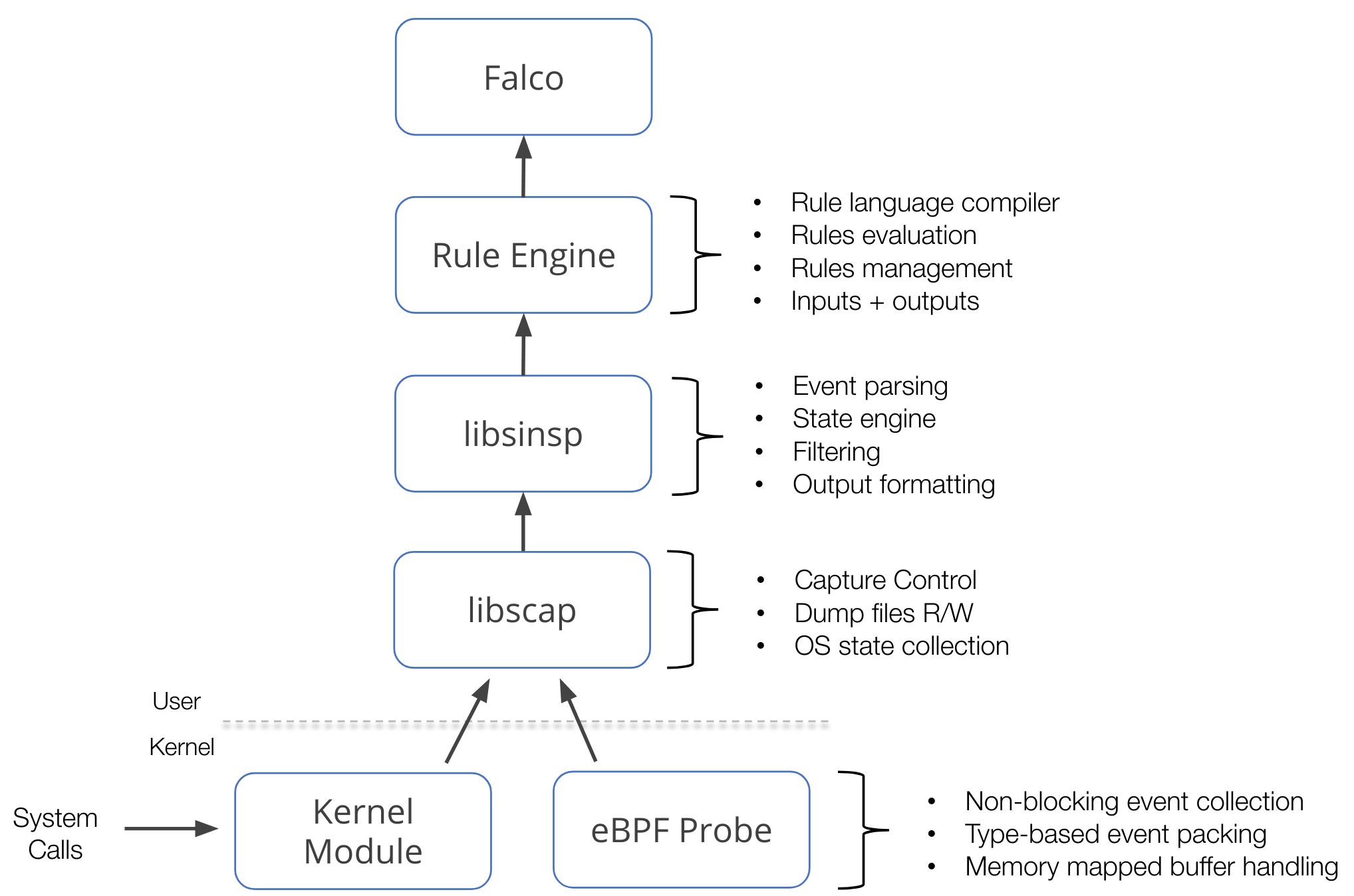As per the OSS Libraries Contribution Plan, this repository has been chosen to be the new home for libsinsp, libscap, the kernel module and the eBPF probe sources.
Refer to https://falco.org/blog/contribution-drivers-kmod-ebpf-libraries/ for more information.
These components are at the foundation of Falco and other projects that work with the same kind of data.
This component stack mainly operates on a data source: system calls. This data source is collected using either a kernel module or an eBPF probe, which we call drivers. On top of the drivers, libscap manages the data capture process, libsinsp enriches the data, and provides a rich set of API to consume the data. Furthermore, these two libraries also implement a plugin framework that extends this stack to potentially any other data sources.
An image is worth a thousand words, they say:
- driver/ contains kernel module and eBPF probe source code, so-called drivers.
- userspace/ contains libscap and libsinsp libraries code,
plus chisels related code and common utilities.
- libscap (aka lib for System CAPture) is the userspace library that directly communicates with the drivers, reading syscall events from the ring buffer (where drivers place them), and forwarding them up to libsinsp. Moreover, libscap implements OS state collection and supports reading/writing to scap files.
- libsinsp (aka lib for System INSPection) receives events from libscap and enriches them with machine state: moreover, it performs events filtering with rule evaluation through its internal rule engine. Finally, it manages outputs.
- chisels are just little Lua scripts to analyze an event stream and perform useful actions. In this subfolder, the backend code for chisels support can be found.
- proposals/ unexpectedly contains the list of proposals.
- cmake/modules/ contains modules to build external dependencies, plus the libscap and libsinsp ones; consumers (like Falco) use those modules to build the libs in their projects.
Libs relies upon cmake build system.
Lots of make targets will be available; the most important ones are:
driver-> to build the kmodbpf-> to build the eBPF probescap-> to build libscapsinsp-> to build libsinsp (depends uponscaptarget)scap-open-> to build a small libscap example to quickly test drivers (depends uponscap)
To start, first create and move inside build/ folder:
mkdir build && cd buildThe easiest way to build the project is to use BUNDLED_DEPS option,
meaning that most of the dependencies will be fetched and compiled during the process:
cmake -DUSE_BUNDLED_DEPS=true -DCREATE_TEST_TARGETS=OFF ../
make sinspNOTE: take a break as this will take quite a bit of time (around 15 mins, dependent on the hardware obviously).
To build using the system deps instead, first, make sure to have all the needed packages installed.
Refer to https://falco.org/docs/getting-started/source/ for the list of dependencies.
Then, simply issue:
cmake ../
make sinspNOTE: using system libraries is useful to cut compile times down, as this way it will only build libs, and not all deps.
On the other hand, system deps version may have an impact, and we cannot guarantee everything goes smoothly while using them.
To build the kmod driver, you need your kernel headers installed. Again, check out the Falco documentation for this step.
Then it will be just a matter of running:
make driverTo build the eBPF probe, you need clang and llvm packages.
Then, issue:
cmake -DBUILD_BPF=true ../
make bpfLibscap contains additional library functions to allow integration with system call events coming from gVisor.
Compilation of this functionality can be disabled with -DBUILD_LIBSCAP_GVISOR=Off.
WARNING: clang-7 is the oldest supported version to build our BPF probe, since it is the one used by our infrastructure.
Libscap ships a small example that is quite handy to quickly check that drivers are working fine.
To build it, issue:
make scap-openThen, to execute it with the eBPF probe, issue:
sudo ./libscap/examples/01-open/scap-open --bpf driver/bpf/probe.oTo execute it with the kmod instead, issue:
sudo insmod driver/scap.ko
sudo ./libscap/examples/01-open/scap-open
sudo rmmod scapYou can look at the other available options by using --help:
sudo ./libscap/examples/01-open/scap-open --helpAs soon as you quit (ctrl-C) the scap-open program, you will be prompted with detailed information on the capture:
---------------------- STATS -----------------------
events captured: 39460
seen by driver: 39912
Number of dropped events: 0
Number of dropped events caused by full buffer: 0
Number of dropped events caused by invalid memory access: 0
Number of dropped events caused by an invalid condition in the kernel instrumentation: 0
Number of preemptions: 0
Number of events skipped due to the tid being in a set of suppressed tids: 0
Number of threads currently being suppressed: 0
-----------------------------------------------------therefore confirming that the drivers are indeed working fine!
Any contribution is incredibly helpful and warmly accepted; be it code, documentation, or just ideas, please feel free to share it!
For a contribution guideline, refer to: /~https://github.com/falcosecurity/.github/blob/master/CONTRIBUTING.md.
Implementing new syscalls is surely one of the highest frequency requests.
While it is indeed important for libs to support as many syscalls as possible, most of the time it is not a high priority task.
But you can speed up things by opening a PR for it!
Luckily enough, a Falco blog post explains the process very thoroughly: https://falco.org/blog/falco-monitoring-new-syscalls/.
This project is licensed to you under the Apache 2.0 open source license. Some subcomponents might be licensed separately. You can find licensing notices here.
